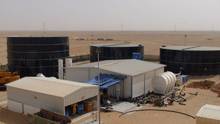Interview with Ragnar Lyng, Director Aqualyng

fresh water, salt water, Norway, Lyng group
Q: You have developed a new technology for transforming salt water into fresh water. Could you tell us how it all started?
In the mid-1990s, the founder of the Lyng Group and Aqualyng –– the now late Bjorn Lyng –– started work on the spectacular Anfi Del Mar resort hotel in the Canary Islands. He was happy with neither the quality nor the price of the water supplied by the local municipality and, in his typical entrepreneur spirit, thought: I can do better! That is how he started working on his own desalination process, with special focus on energy recovery. The first Aqualyng plant was built in the Canaries in 1998 and the company has since expanded to work on four continents.
Q: One of the challenges in the years to come will be to ensure a supply of fresh water to the world’s population. Do you really think that you can make a difference?
In the 1990s, the energy consumption for producing one cubic metre of potable water via desalination would have been between 5 and 6 kilowatt-hours (kWh). Bjorn Lyng and his team focused on reducing energy consumption, knowing that this would be critical in opening up new markets for desalination. Aqualyng –– with its energy recovery device, the Recuperator –– has been an important driving force in reducing costs for the water desalination industry. Energy consumption for producing one cubic metre of water is today between 2 and 3kWh. This means that the “reverse osmosis” technology is now available to various markets where it had previously been too expensive.
Q: “More water, less energy” is a slogan to be found on your website. How does it work?
It all depends how you look at it. Of course, if you have a large river passing through your city containing fresh, clean water, desalination cannot compete. But that is unfortunately not the case with many countries that need more water than is available from surface and ground water. Their alternatives are either to build long pipelines from more water-rich areas, or actually to continue surviving with an undersupply of water. Pakistan as an example: they cannot expect to obtain more water from the River Indus than the country is already using. They need to rely on desalination to cope with the growing demand.
There are numerous ways of desalinating seawater, but the most popular method is called “reverse osmosis”. This is a process where seawater is filtered through membranes. The seawater will have a pressure of about 50-bar when going through the membranes. After passing through, about 40% of the input water will come out as freshwater.

Q: "As long as we have oceans, we can produce good drinking water at low cost" is another slogan to be found on your website. Is it really that cheap?
Today, with the energy recovery system patented by Aqualyng, you can produce 1,000 litres of high-quality drinking water at a cost of less than US$1, exclusive of financial investments. In most markets, that is a very cost-competitive way of obtaining stable access to high-quality drinking water.
Q: You are about to finish a desalination plant in Karachi, Pakistan. Could you tell us something about other projects around the world?
Aqualyng has installations in the Canary Islands, Morocco, Egypt, Taiwan, Saudi Arabia and Oman. We have also secured a large contract in Ghana, where we built a plant producing 20,000m3/day for Ghana Water on a build/own/operate basis. In other words, we assume all the financial costs for building the plant and operating it. We then sell the water to the local water authorities who can then fill their empty pipelines with high-quality drinking water.
In fact, in the Nungua area, Ghana has been suffering from a water shortage for some time. This initiative from Ghana Water to introduce desalination is a major step towards improving a critical situation. This is the first large-scale desalination project in West Africa and is part of a long-term plan to introduce Aqualyng desalination plants to numerous locations along the Ghana coastline.
We have also supplied a plant producing 9,000m3/day for the Royal Palace in Jeddah, Saudi Arabia. This was a very prestigious project and something we are very proud of.
Q: Your family has been involved in a wide range of technological inventions in a variety of markets. What exactly have you invented?
The Lyng Group has always focused on inventions. Some of the success stories are:
• Elsafe, started in 1979, is the biggest international success of the Lyng Group so far. This electronic safe can today be found in most 3-, 4- and 5-star hotels in over 150 countries.
• Lyng Drilling has recently been sold to an American company –– Schlumberger –– but has been one of the great successes of the Lyng group. Production of drilling bits for the offshore oil industry was the core business of this company.
• Lyng Motor has developed a device that controls valves on ships. The “Eltorque” is regarded as the world’s finest electrical valve activator for such applications, and Lyng Motor is one of the most exciting companies in the Lyng Group at the moment.
• Anfi Del Mar, built by Bjorn Lyng in the mid-1990s, is regarded as the most spectacular resort hotel in the Canary Islands. It is still 50% owned by the Lyng Group, and is –– with close to 900 rooms –– a truly spectacular hotel that is today one of the flagships in the Lyng Group portfolio (www.anfidelmar.com).


